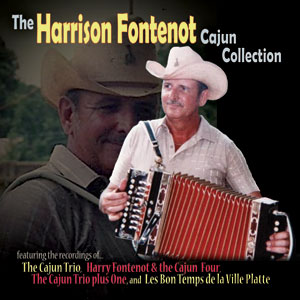Harrison Fontenot
HARRISON FONTENOT approached me in the early 60’s to record his Cajun songs and novelty record ideas. He was jamming with his Cajun musician buddies playing his Hohner accordion until he met Cajun music legend and accordion player, Sidney Brown. Sidney was building Cajun replicas of the old Sterling and Monarch German-made accordions that were imported before WWII. Harrison was eager to learn from Sidney and build his own accordion, which he did. He worked as a crop dusting pilot for several years until a stroke prohibited him from flying planes, which he loved dearly and was his living. He could fly crop dusters only a few months of the year and earn enough to enjoy his hobby of building things in his workshop and playing Cajun music with friends and family the rest of the year. One of his close friends was Clint West, legendary Swamp Pop singer/drummer (who began his music career as a drummer for the Vidrine Playboys, a local Cajun band). He and Clint persuaded me to record the CAJUN TRIO (Clint-drums, Harrison-accordion, Allen West-guitar). Their first hit record was a Cajun version of “The Twist”(1962). Cajun radio DJs played it, the jukebox operators bought copies for their jukeboxes, a fan base bought records, and a recording career was born. He was like a Cajun version of the legendary country music singer/songwriter Mel Tillis…he stuttered when he spoke but not when he would sing. Both used stuttering to their advantage. Many times he would phone to pitch an idea for a new record but would stutter so much that he had a hard time getting his message across, so I would have to tell him to SING what he wanted to SAY, and then everything was OK. We became good friends and besides making records, we shared a lot of laughs over the years. I once had the idea of calling Mel Tillis when he had a theater, in Branson (MO), to try and convince him that a Cajun singer who plays an accordion and stutters (like he did) would have possibly made a great variety act for his show…especially if both of them were on stage trying to speaking to each other.
Some of the Harrison’s tunes would bring a tear to your eye, but most brought you a smile and laughter. You would have loved to have heard and seen him perform in person! ~ Floyd Soileau, founder/owner Swallow Records
Harrison passed away January 21, 2011.
Reviews:
OffBeat Magazine, Dan Willging (May 2019)
The name Harrison Fontenot may not be a regular topic of conversation among Cajun music fans beyond Acadiana, but nonetheless this 26-track posthumous collection will likely bring more notoriety to one of the genre’s colorful and regionally beloved figures. By all accounts, Fontenot (1934-2011) was an incredibly interesting individual, a crop duster, a talented accordionist/vocalist, and accordion builder (Imperial). He fronted various bands and recorded several 45s between 1961 and 1983, all of which make their full-length debut here.
Many of these selections will make you laugh when you recognize the melody. “Beverly Hillbillies” is recast as “Mamou Hillbillies,” Tex Williams’ “Smoke! Smoke! Smoke! (That Cigarette)” becomes “Fume, fume, fume” and The Oak Ridge Boys’ “Elvira” is Cajunized as “Clotilla.” He even modifies “Wabash Cannon Ball” to include locales like Basile (much to the delight of his listeners) and makes his accordion honk like a train whistle towards the end. Also featured in this collection is Fontenot’s first hit “Cajun Twist,” a version of Chubby Checkers’ “The Twist.” It seems there wasn’t anything Fontenot couldn’t play on his loud little box.
While much of this collection focuses on Fontenot’s novelty side, he also has a poignant side, as evidenced by “Lonesome Soldier Waltz.” He cut his own version, “Une Histoire Triste,” of the Cajun weeper “J’ai Passé Devant Ta Porte” by adding a recitation of the maudlin story line for an even greater punch to the heart. No doubt Fontenot was cut from a different cloth than his contemporaries. It’s one that still wears well today for connoisseurs of the unvarnished, rough-and-tumble Cajun sound.
BluesRag Magazine, Dennis Rozanski (Summer 2019)
With Harrison Fontenot, you were never quite sure what was being targeted next: either your funny bone or your dancing shoes. Didn’t matter—his party always hit its mark, whether rolled out comically as “Mamou Hillbillies” or careening through “Let’s Go to Lafayette” at a serious breakneck pace. Whatever group he was fronting at the time—the Cajun Trio (accordion/guitar/drums), the Cajun Trio Plus One, Harry Fontenot & the Cajun Four, Les Bon Temps de la Ville Platte—worked under the same steadfast principles: Make it simple. Make it fun. And make it cook.
By covering 26 songs in 54 minutes, Fontenot’s Cajun Collection certifies that the crop-dusting pilot also flew accordions. Rough-and-tumblers like “Fee Fee Can’t Dance” or “May You Never Be Alone” drive hard with such unrestrained wildness that band members often impulsively shout out in the heat of battle. Outside material was continually brought into the Cajun fold. Some retained their given name, but distinctively bore Acadiana’s musical mark (“Ghost Riders in the Sky,” “Jingle Bells”). Some were mildly rechristened and distinctively bore Acadiana’s musical mark (“Cajun Limbo Rock,” “Cajun Twist,” “Cajun Saints Go Marching In”). Some were rewired all the way around (“Clotilla,” the Oak Ridge Boys’
oom-poppa-mow-mowing “Elvira”). All, however, came dressed for a fais do-do.

